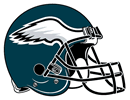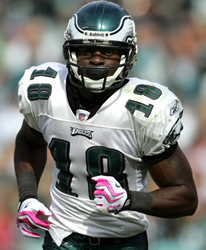 QB Michael Vick
QB Michael Vick
Well, what is there to say? If you plucked Vick off the waiver wire in 2010, there’s a strong possibility he carried you to a championship in your fantasy league. Simply put, he was the most dynamic fantasy player last season—averaging a remarkable 29.7 points per game—and the most dynamic fantasy quarterback over the course of a season ever. Consider the highest career PPG totals of the league’s other top fantasy quarterbacks: Tom Brady, 28.9; Peyton Manning, 26.7; Aaron Rodgers, 25.1; Drew Brees, 24.7. Vick came into his own in 2010, displaying an uncanny knack for big plays both with his arm and in the running game, where he rushed 100 times for 676 yards and nine touchdowns. Despite finishing fourth in yards per passing attempt, he completed a career-high 62.6 percent of his passes (his previous high was 54.6) and threw for 3,018 yards and 21 touchdowns with just six interceptions. If you’re looking for a knock on Vick, it’s that his refusal to avoid hits when carrying the ball caused him to miss three games to injury (he also sat out the season finale to rest for the playoffs). Consider Vick a top-five quarterback in redraft formats, although with a qualifier due to his injury risk.
RB LeSean McCoy
McCoy proved he was the real deal in his first full year as the Eagles’ starter at running back. The 2009 second-round pick made Eagles fans forget Brian Westbrook and made his fantasy owners ecstatic, courtesy of his 1,080 rushing yards, 592 receiving yards, and nine touchdowns. That production vaulted McCoy into the top ten at running back, and he finished at eighth despite taking Week 17 off to rest for the playoffs. He was also remarkably consistent, reaching double-digit fantasy points in 12 of the 15 games he played. McCoy isn’t the fastest or most elusive running back in the league, but he possesses enough ability in both areas to be a dangerous runner. His pass-catching ability helps separate him from several of the other upper-tier running backs—as does the presence of quarterback Michael Vick. With Vick requiring a defensive spy and DeSean Jackson often double-teamed out wide, defenses can’t focus on McCoy. Because of that, he is a solid bet to duplicate his 2009 ranking with an outside chance of entering the top five, especially in PPR leagues.
RB Jerome Harrison
The Mike Bell experiment didn’t last long in Philadelphia as he was shipped off to the Browns for another disappointing runner in Jerome Harrison. The change of scenery benefitted Harrison, however, as he seemed a more natural fit in Philadelphia than in Cleveland. In limited opportunities, he rushed for 330 yards, averaging 4.6 yards per carry, with one touchdown. If LeSean McCoy were to go down, Harrison would likely put up RB2 production as his replacement. The Eagles took Dion Lewis in the fifth round of this year’s draft, and he will battle Harrison for the backup spot. Monitor that situation and consider Harrison a decent handcuff option (but not an imperative one), provided he wins the job.
WR DeSean Jackson
Picked in the second round of the 2008 draft, Jackson has since established himself as the premier pass catcher of his rookie class, with 3,124 receiving yards and 17 receiving touchdowns through his first three years in the league. The speedy Jackson is a highlight-reel playmaker, capable of scoring at any time from any position on the field. After finishing as the ninth-ranked fantasy wideout in 2009, his production dipped slightly in 2010 as he finished with 47 receptions for 1,056 and six touchdowns. The main reason for the drop was due to a concussion he received on a devastating hit from Falcons cornerback Dunta Robinson. That caused him to miss the rest of the game and the next two games as well. However, he also had fewer big plays last year, and that is one of the issues with Jackson’s fantasy production. While he is a big-play machine, he doesn’t catch many passes, which results in a number of games with low fantasy points. In 45 career games, Jackson has reached double-digit fantasy points just 17 times and has 18 games with five or fewer points. When he booms, he booms. When he busts, he busts. Jackson will be drafted as a WR1, but you need to ask yourself if you want to put up with the inconsistency he brings to the table.

Jeremy Maclin: The Eagles top fantasy wideout in 2010.
WR Jeremy Maclin
Think fast! Who was the Eagles’ top fantasy producer at wide receiver last season? DeSean Jackson? Nah, it was Maclin. With 70 receptions for 964 yards and a whopping ten touchdowns, Maclin’s 160 fantasy points topped Jackson by three points and was good enough to place him 12th at wide receiver. Better yet, Maclin showed major improvement over his rookie season (when he caught 55 passes for 762 yards and four touchdowns) and figures to improve even more in his third season, the point at which many wide receivers take a big step forward. Add in the fact that the Jackson commands a healthy dose of double teams, leaving Maclin facing predominantly single coverage, and he seems like a sure bet to cement his 2011 status as a top-tier WR2 or perhaps a low-end WR1. While Jackson will go higher in fantasy redraft formats because of his superior skills and bigger reputation, Maclin will be the better value and is a far more consistent performer.
WR Jason Avant
After signing a five-year contract extension prior to the 2010 season, Avant merely duplicated his 2009 production, catching 51 passes for 573 yards and a touchdown. Even though he had 16 more targets in 2010, he failed to capitalize on the increased opportunity as he suffered a case of the dropsies, including a couple of easy ones in the end zone. Entering 2011, he will battle second-year receiver Riley Cooper for playing time. Look for Avant to hold off Cooper, but it seems that a drop in production remains likely for Avant. Tight end Brent Celek figures to be more involved this season, and Cooper will nonetheless eat into Avant’s targets. Unless injuries strike DeSean Jackson or Jeremy Maclin, Avant is only worth owning in the larger leagues with deep rosters.
TE Brent Celek
Celek entered 2010 coming off a breakout campaign in which he caught 76 passes for 971 yards and eight touchdowns—production that made him the fourth-ranked fantasy tight end in 2009. Things turned sour early in 2010, however, when quarterback Kevin Kolb was replaced by Michael Vick. Vick overlooked Celek early and often last season, leaving the talented pass-catching tight end as one of the biggest fantasy disappointments of the year. His production plummeted to 42 receptions for 511 yards and four touchdowns. Clearly, Celek benefitted in 2009 from playing with Donovan McNabb, who had made marginal talents such as Chad Lewis and L.J. Smith into solid producers at tight end. Heading into 2011, Celek’s prospects for a big rebound look remote. Vick is entrenched at quarterback and will have his favorite targets in DeSean Jackson and Jeremy Maclin back at wide receiver. Consider Celek worth taking a flier on only as a backup tight end.
